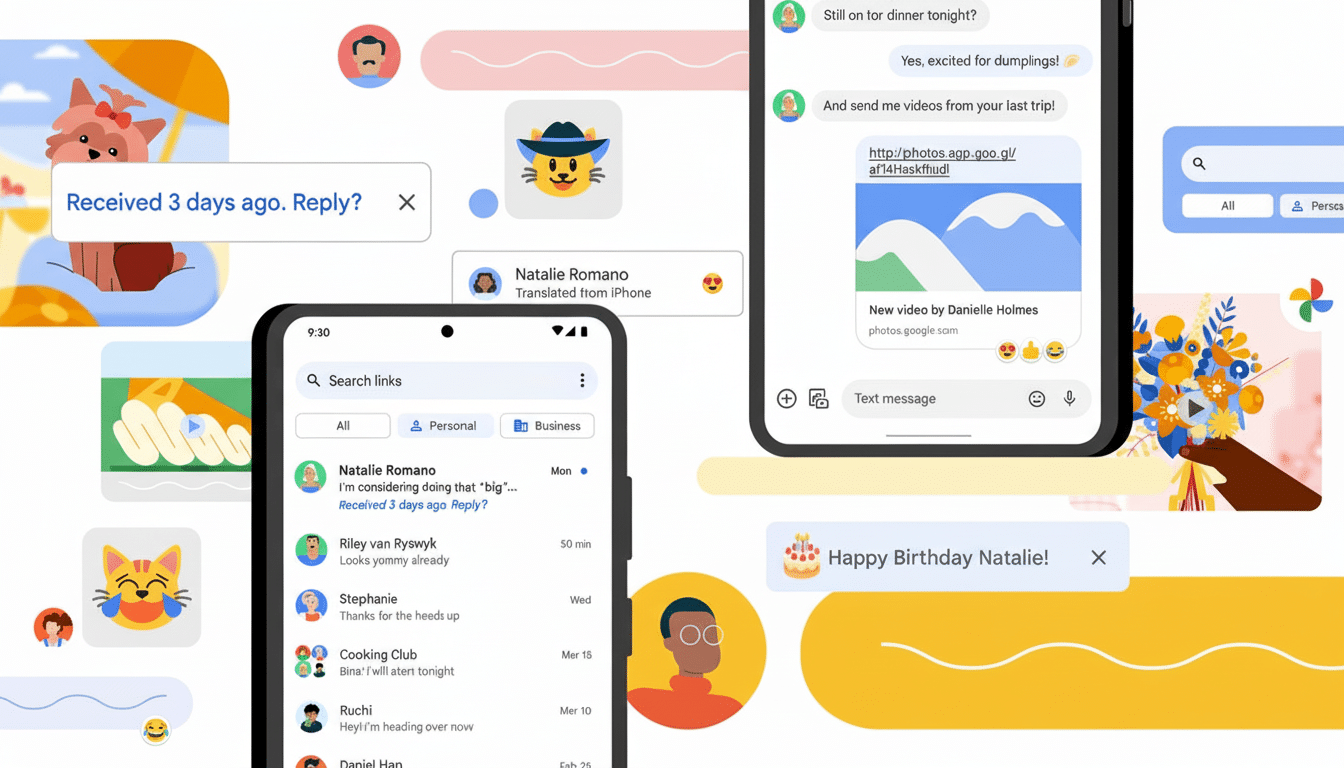Google’s newest Pixel Drop is leaning heavily on communications, with new messaging features and some quality-of-life tweaks. Most features arrive for Pixel phones going all the way back to the Pixel 6, though a couple of AI-driven bonus options are only available on the more recent hardware.
AI Remix arrives in Google Messages for creative edits
The headliner here is Remix in Google Messages, an image-playground feature that lets you remix a photo shared in chat using Google’s Nano Banana image-generation model. Tap to remix an image and swirl up fun surprises—think decals, custom stickers, playful photos, and more; play around or start with something you’ve already sent in Messages before—there’s no wrong way to go.

Remix will be available first to US, UK, Australia, Canada, India, Ireland, and New Zealand Pixel users with RCS features. Mandating RCS is consistent with Google’s broader efforts to beautify texting, which include read receipts, high-quality media sharing, and end-to-end encryption for 1:1 conversations. GSMA has said RCS adoption is increasing globally, and features like this will help push the standard along.
For privacy and security purposes, Remix lives in Messages, not as a stand-alone AI app; the intent is to discourage context switching and prevent you from simply pasting your most personal images into another part of the phone. Google is also claiming that the model behind Remix has been tailor-made to generate responsive, featherweight images good for use on phones.
Smarter scam shields outside of Messages
Google is rolling out its fraud detection system to hang up on more spam calls. Third-party messengers including Discord and Telegram can now display a “Likely Scam” warning on notification banners if the system finds evidence of common scam techniques. The goal is to nab unsafe outreach before you open the app.
That’s a timely move. Consumer protection agencies have long held messaging apps to be ripe for phishing, investment frauds, and “pig-butchering” cases. The US Federal Trade Commission has reported billions lost annually to fraud, including a significant chunk due to imposter scams. Bringing risk signals to the notification layer could enable a user to pause before acting.
VIPs get real priority to surface important messages
Google’s concept of VIPs, which came with Android’s most recent releases, becomes more useful this fall. Messages from the humans you designate as very important now jump to the top of the queue so that important text from, say, a partner or a caretaker doesn’t get lost in group-chat cacophony.
The Contacts widget also becomes intelligent: If a VIP you know is near severe weather, or another type of critical event, you’ll see an alert related to that person. This sort of context-aware prioritization is where mobile notifications have had to go — less spam, more signal — particularly for families and teams working together in real time.

AI summaries and a Maps mode for newer Pixels
Summarized conversations condense long threads of back-and-forth into a quick, slick view you can scan in seconds. Like any summarizer, nuance can be lost and inside jokes may confuse a model, but it’s a helpful way to catch up with active chats. Notice: This feature is available only on Pixel 9 or later; Pixel 9a does not support this due to limitations in on-device AI.
People with a Pixel 10 get a new low-power mode in Google Maps that strips out everything from the interface except for the absolute basics. The trade-off is less visual flourish and backgrounding for the peace of mind of those times (like road trips, without a charger) when you need as much battery life as you can get.
Wicked theme packs arrive alongside wider rollout
On the customization front, Google is shipping theme packs with Wicked for Good, which means you’ll have matching wallpapers, icons, system sounds, and GIFs. It’s purely cosmetic, but it demonstrates that Google is continuing to make an effort for Pixel phones to feel thoughtfully put together out of the box, rather than stock Android with just another camera app.
Importantly, most of these updates — Remix, scam warnings, and VIP enhancements — are compatible with devices as old as the Pixel 6. That breadth matters. Previous Pixel Drops would sometimes lock marquee features to the latest models, but this release meaningfully improves the experience for a broader installed base.
Why this Pixel Drop matters for messaging and safety
For everyday users, the update takes aim at two friction points: keeping up with busy conversations and keeping oneself safer in a world where bad actors are increasingly targeting messaging platforms. The combination of playful (Remix) and no-nonsense (scam and VIP signals) feels true to how people actually use their phones — part entertainment, part coordination exercise, part watchfulness.
It also encapsulates the Google mobile AI strategy: Provide context-aware, light-touch features where most appropriate and gate all of the weighted lifts to devices with suitable silicon. As Apple inches toward RCS connectivity and carriers keep pushing toward modern messaging, the Pixel’s regular Drops help Google’s phones feel new between new versions of the OS — and keep conversations in motion.

